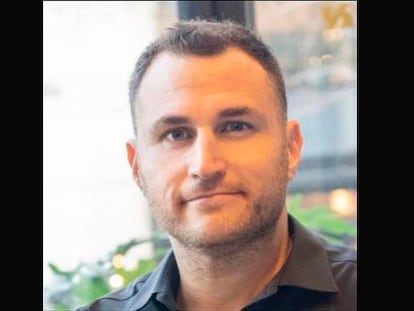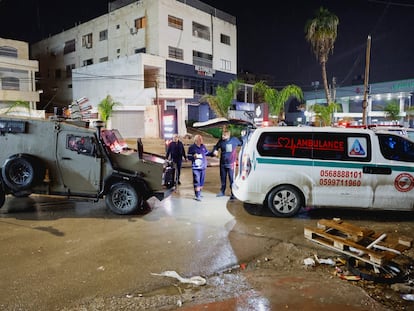The incomplete joy of a Bedouin family in Israel: Two freed hostages and two still in Gaza
Aisha, 16, and Bilal, 18, returned to their village in southern Israel after being included in the hostage-prisoner exchange but left their father and another sibling behind in the hands of Hamas
The large Ziadna family, Bedouins from southern Israel, joyfully celebrated the release of two of their members in front of the television screen: Aisha, 16, and Bilal, 18. They departed Gaza on the night of November 30 during the last exchange of Palestinian prisoners and hostages in the Gaza Strip agreed upon during the week-long truce between Hamas and Israel. “We all jumped at the sight of the images, when they were already in the hands of the Red Cross,” says Kamel Ziadna, 30, a cousin of the released hostages. He immediately adds: “But the joy is not complete. Hamza and Yousef are missing.” Kamel tries to imagine how hard it must have been for the four of them to be separated, as they were held together during their 55-day captivity until the two siblings were added to the list of those who benefited from the exchange.
The end of the ceasefire at dawn on December 1, a few hours after the release of Aisha and Bilal, returned the Ziadna family to a state of permanent uncertainty as the exchanges, at least for now, came to an end. The outlook, they acknowledge, is not encouraging. The war has resumed with enormous intensity, the Israeli army has extended its occupation to the south of Gaza and there is no indication of another truce.
Along with Hamza and Yousef Ziadna, the latter of whom suffers from high blood pressure and diabetes, 136 hostages remain in the Gaza Strip, although 15 of these have already been confirmed dead. After being treated in the Soroka hospital in the city of Be’er-Sheva for a few hours, during which Israeli authorities carried out some tests on them, the two freed siblings returned to their village of Ziadna on December 2, a locality with a population of about 2,000 inhabitants from which the family takes its name. They were the first two hostages from the Arab-Israeli community — which represents about 20% of Israel’s 10 million inhabitants — to be released. About half a dozen more remain captive in Gaza, according to local media.
The images recorded of their arrival in the village bear witness to a sober welcoming ceremony. Just hugs and handshakes from those present, no music or dancing. “There was no party. We could not celebrate. We are all still praying for the return of Yousef and Hamza and for all those killed in the war, on both sides,” says Kamel. Mention of prayers for the victims on both sides — more than 16,000 people have died in Gaza since the start of the war; Hamas killed 1,200 in its October 7 attacks — is rare these days in Israel. And as if to send a message to Hamas, Kamel stresses that neither his cousin nor his uncle has ever served in the Israeli army, where the Bedouin minority is exempt from compulsory military service. The Bedouins, a community traditionally neglected by their country’s authorities, are Arabs and Muslims who feel overwhelmingly Palestinian on Israeli soil.
One of the two roads leading to Ziadna winds through the rotting remains of dead animals, garbage, and rubble. The road advertises the conditions in which the family lives even before arriving. To the left the garbage, through which a dog walks and a tethered horse paces, makes way for the shacks. “This is no longer Ziadna; it is the territory that the Jews have been taking from us,” says Kamel, who adds that his ancestors, of nomadic tradition, settled in this place years before Israel came into existence as a state in 1948.
Inside the village, a circle of about 20 men shared a conversation last Monday over cups of coffee, tea, and bottles of water. They all stand up and shake hands when a young boy arrives and, without saying a word, joins the group. It is Bilal, who occupies one of the plastic chairs. The family does not accept questions or photographs. A military spokesman has already made it clear that the information obtained from the debriefing of the released hostages, which could prove essential in trying to rescue the rest, will not be divulged.
With Bilal present, the chats are resumed in a kind of welcoming ceremony. In it, the passage of time is not marked by the clock, but by the slow protocol of the men of the desert. Some of those who have come are military men in uniform with their regulation weapons resting on their legs. There are authorities or residents from surrounding towns, as well as some of the 19 children Yousef has: 15 with the mother of the three who were taken hostage, and four with a second wife. Others present, including several of Yousef’s brothers, are leaders within the village, a dusty wasteland where there is no electricity, water, or paved roads. There is also no school or health center, says Kamel.
Ziadna is located on the outskirts of the urban center of Rahat, which with some 60,000 inhabitants is considered the largest Bedouin city in the world and is one of the largest pockets of poverty in Israel. Aisha and Bilal returned here after their kidnapping without a trace of violence on their bodies, only with the loss of a few pounds in weight, says Kamel, while noting that during the current war “everyone in Gaza has problems finding food.”
At one point, three men with notebooks and pens retreat with Bilal into the sheq, a room made of sheet metal and prefabricated material where the men of the clan gather and at whose door the others are still gathered. They are psychologists trying to help him recover after being held hostage. Meanwhile, there is no public trace of Aisha or any of Ziadna’s other women. The last time the entire family was together was during a wedding celebration on October 6, the eve of the Hamas attack on Israel. The following day, Kamel estimates at around 2 a.m., Yousef and Hamza, accompanied by Aisha and Bilal, went to Kibbutz Holit, next to Gaza, where they work in a cowshed. There they were caught at 4 a.m. by the arrival of the Islamist militias.
Billboards bearing the faces of Aisha and Bilal can be seen on the streets and access roads in Rahat. They read: “Congratulations on your freedom. And now, the rest.” Neither of the two had managed to finish high school because of the problems of living in a village like Ziadna, says Kamel. He himself points out that he had to study medicine abroad, in Romania. He appeals to Qatar, Egypt, and even Hamas for help to have his uncle and cousin released.
“Hamza is a great friend of mine and I miss him a lot,” he says as he shows pictures of them on his phone and recalls the final hours they spent together before the Hamas attack. Kamel explains that he is single and unattached, something that to some extent may come as a shock at 30 years of age in the shadow of Bedouin tradition. Hamza, he adds, married in 2020 and, at 22, has a two-year-old son and a four-month-old daughter.
No one has moved his car since the day he was kidnapped. It remains parked in front of his home. Part of what he earns working with the cows is put toward rebuilding the house, which, according to his cousin, has already been demolished twice by the Israeli authorities, who consider Ziadna an illegal village along with 36 others that are home to some 80,000 Bedouins. Yousef’s house has also been demolished up to four times, Kamel says.
The Bedouin population of Palestinian origin in the Negev desert, who have been settled in this territory for centuries and whom the Israeli government is trying to remove from their traditional way of life, now numbers around 310,000 people. Two-thirds of these citizens live below the poverty line, a rate three times the national average. This is where Kamel Ziadna is trying to fulfill a double dream: to add pediatrics to his training as a general practitioner and, also attached to the weight of his ancestors, to marry and have children. “It’s not easy to be a Bedouin, but we have to be Bedouins,” he says.
Sign up for our weekly newsletter to get more English-language news coverage from EL PAÍS USA Edition
Tu suscripción se está usando en otro dispositivo
¿Quieres añadir otro usuario a tu suscripción?
Si continúas leyendo en este dispositivo, no se podrá leer en el otro.
FlechaTu suscripción se está usando en otro dispositivo y solo puedes acceder a EL PAÍS desde un dispositivo a la vez.
Si quieres compartir tu cuenta, cambia tu suscripción a la modalidad Premium, así podrás añadir otro usuario. Cada uno accederá con su propia cuenta de email, lo que os permitirá personalizar vuestra experiencia en EL PAÍS.
En el caso de no saber quién está usando tu cuenta, te recomendamos cambiar tu contraseña aquí.
Si decides continuar compartiendo tu cuenta, este mensaje se mostrará en tu dispositivo y en el de la otra persona que está usando tu cuenta de forma indefinida, afectando a tu experiencia de lectura. Puedes consultar aquí los términos y condiciones de la suscripción digital.










































